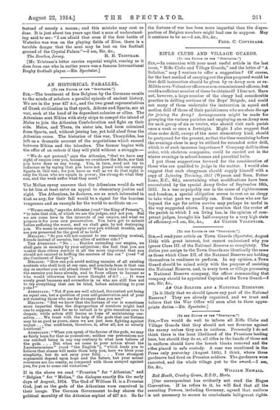AN HISTORICAL PARALLEL.
LTO THE EDITOR Or THE "SPECTATOR."]
SIR,—The treatment of free Belgium by the Germans recalls to the minds of scholars a parallel episode of ancient history, We are in the year 427 B.C., and the two great representatives
of Greek civilization in that epoch, Athens and Sparta, are at war, each at the head of its dependent colonies or allies. The Athenians sent Nikias with sixty ships to compel the island of Melos to join the Athenian Confederation and fight on their side. Melos, and Thera, its sister isle, had been colonized from Sparta, and, without joining her, yet held aloof from the Athenian cause. The historian of this war, Thucydides, has left us a dramatic account of the negotiations which ensued between Nikias and the islanders. The former begins with the offer of an entente if they will yield without a struggle :— "We do not pretend," says the Athenian, "that we have any right of empire over you, because we overthrew the Mede, nor that you have done us any wrong. You, in turn, need not try to influence us by saying that you have not joined with our enemy Sparta in this war; for you know as well as we do that right is only for those who are equals in power; the strong do what they can, and the weak suffer what they must."
The Mellen envoy answers that the Athenians would do well to let him at least enter an appeal to elementary justice and right. The Athenians, he declares, are as much interested in that as any, for their fall would be a signal for the heaviest vengeance and an example for the world to meditate on :—
"We are ready," says the Athenian (read "the King of Prussia"), "to take that risk, of which we are the judges, and not you. But we are come here in the interests of our empire, and what we propose is for your own preservation. You have got to submit before suffering the worst, and we shall gain by not destroying you. We mean to exercise empire over you without trouble, and see you preserved for the good of us both."
MemAtes : " So you will not consent to our remaining neutral, friends instead of enemies, but allies of neither side ? "
THE ATHENIAN : " No. . . . Besides extending our empire, we shall gain in security by your subjection ; the fact that you are weaker than others renders it all the more important that you should not succeed in baffling the masters of the sea" (read "of the Continent of Europe").
MELIANS : "How can you avoid making enemies of all existing neutrals who shall look at our case, and conclude from it that one day or another you will attack them? What is this but to increase the enemies you have already, and to force others to become so 'who would otherwise have never thought of it ? . . . It were surely great baseness and cowardice in us who are still free not to try everything that can be tried, before submitting to your yoke ? "
ATHENIANS : "Not if you are well advised, the contest not being an equal one, but a question of your self-preservation and of your not resisting those who are far stronger than you are."
BlEmerts : "But we know that the fortune of war is sometimes more impartial than the disproportion of numbers might lead one to suppose; and for us to submit is to give ourselves over to despair, while action still leaves us hope of maintaining our- selves.... We trust with the help of the gods that our fortune may be as good as yours, since we are just men fighting against unjust.... Our confidence, therefore, is, after all, not so utterly irrational."
ATHENIANS " When you speak of the favour of the gods, we may as fairly hope for that as yourselves ; neither our pretensions nor our conduct being in any way contrary to what men believe of the gods. . . . But when we come to your notion about the Lacedaemonians " (read "the English "), "which leads you to believe that shame will make them help you, here we bless your simplicity, but do not envy your folly. . . . Your strongest arguments depend upon hope and the future, but your actual resources are too scanty, as compared with those arrayed against you, for you to come out victorious."
If in the above we read "Prussian" for "Athenian," and "Belgian" for "Mellen," the dialogue exactly fits the early days of August, 1914. The God of William IL is a Prussian God, just as the gods of the Athenians were conceived in their image. The German Government to-day shares the political morality of the Athenian sophist of 427 B.C. So far
the fortune of war has been more impartial than the dispro- portion of Belgian numbers might lead one to suppose. May it continue to be so.—I am, Sir, &c., FRED. C. CONYBEARB.


































 Previous page
Previous page